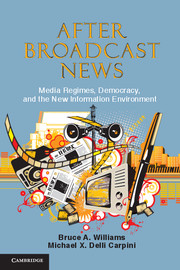Book contents
- Frontmatter
- Contents
- Acknowledgments
- 1 Is There a Difference Between Tina Fey and Katie Couric? Policing the Boundaries Between News and Entertainment
- 2 Media Regimes and American Democracy
- 3 And That's the Way It (Was)
- 4 Political Reality, Political Power, and Political Relevance in the Changing Media Environment
- 5 Politics in the Emerging New Media Age
- 6 When the Media Really Matter
- 7 9/11 and Its Aftermath
- 8 Shaping a New Media Regime
- References
- Index
- References
4 - Political Reality, Political Power, and Political Relevance in the Changing Media Environment
Published online by Cambridge University Press: 05 June 2012
- Frontmatter
- Contents
- Acknowledgments
- 1 Is There a Difference Between Tina Fey and Katie Couric? Policing the Boundaries Between News and Entertainment
- 2 Media Regimes and American Democracy
- 3 And That's the Way It (Was)
- 4 Political Reality, Political Power, and Political Relevance in the Changing Media Environment
- 5 Politics in the Emerging New Media Age
- 6 When the Media Really Matter
- 7 9/11 and Its Aftermath
- 8 Shaping a New Media Regime
- References
- Index
- References
Summary
The important consideration is that opportunity be given ideas to speak and to become the possession of the multitude. The essential need is the improvement of the methods and constitution of debate, discussion, and persuasion. That is the problem of the public.
– John Dewey, The Public and Its Problems, 1927I am a firm believer in the people. If given the truth, they can be depended upon to meet any national crisis. The great point is to bring them the real facts, and beer.
– Abraham Lincoln, (attributed), 1864I’ve always gotten news through watching comedy shows. The coverage on CNN is something I honestly find boring.
– Alexis, University of Illinois undergraduateThroughout the spring of 2000, huge numbers of viewers across the country tuned into the final episode of Survivor, a new “reality-based” show airing on CBS. Survivor placed a group of sixteen “ordinary” people on a tropical island, staged a variety of obstacles for them to overcome (in addition to just surviving), and then had the participants vote one person off the island each week. The last show of the inaugural series, during which the final survivor Richard Hatch was chosen (and given a million dollars), was the second-most-watched show of the year, drawing 51 million viewers, behind only the 88 million of the Super Bowl, a much older form of reality programming. The success of this show (and its sequels) inspired networks to air any number of variations on the theme of ordinary people being placed in stressful situations for the chance to win fame and/or large amounts of money.
The combination of potentially high ratings and routinely low production costs led to an explosion of this new genre of “reality” television. Big Brother, currently in its eighth season on American television, originated in the Netherlands in 1999 and went on to become a hit in seventy countries. The show placed a group of strangers in a small house in which their everyday lives could be minutely chronicled by television cameras strategically placed throughout the domicile. Each week, the roommates nominated two of their group for eviction, with the viewing audience ultimately deciding which of the two was actually eliminated from the show. Who Wants to Marry a Multi-Millionaire? placed fifty attractive women in a beauty-pageant competition (including the usual swimsuit segment) for the grand prize of an on-air marriage to a multimillionaire. In a particularly baroque variation, Temptation Island had couples in long-standing relationships test their commitments by being separated and placed on an island stocked with attractive singles. Fear Factor placed people in situations in which they had to carry out a terrifying task (e.g., eating a can of worms, entering a pool of spiders) selected because they played to specific fears or neuroses of the participants. Based on the hit British show Pop Idol, American Idol had contestants with a wide range (to put it kindly) of show-business talents perform on stage, with viewers voting one of the show's contestants as the most likely to become a celebrity, or American idol.
- Type
- Chapter
- Information
- After Broadcast NewsMedia Regimes, Democracy, and the New Information Environment, pp. 104 - 134Publisher: Cambridge University PressPrint publication year: 2011



